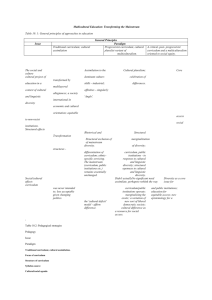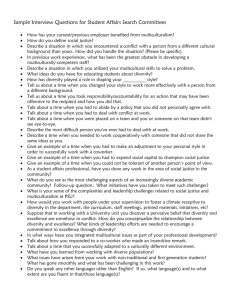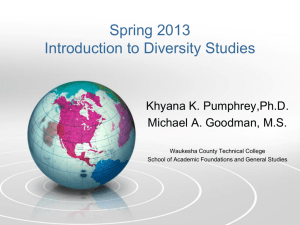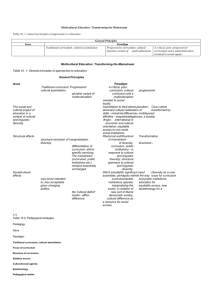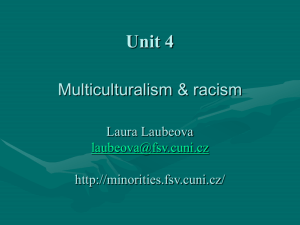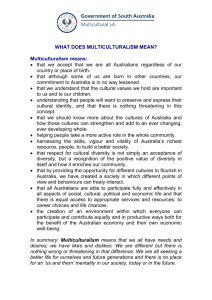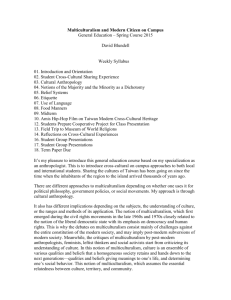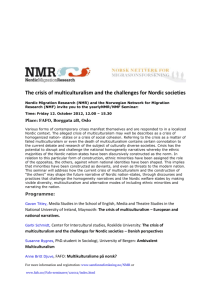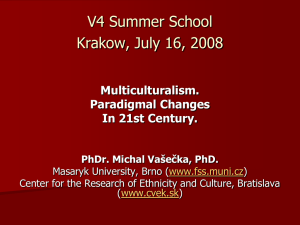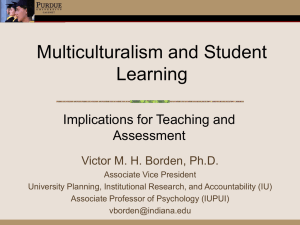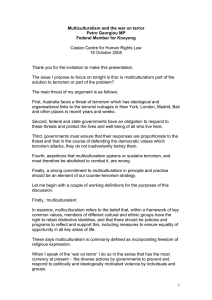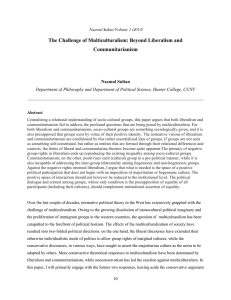Different dimensions of multiculturalism
advertisement
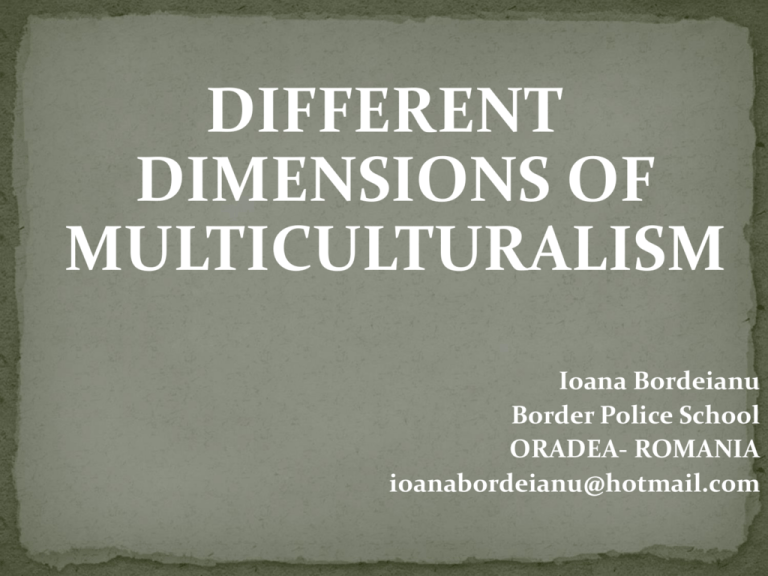
DIFFERENT DIMENSIONS OF MULTICULTURALISM Ioana Bordeianu Border Police School ORADEA- ROMANIA ioanabordeianu@hotmail.com 1. What is multiculturalism? Relating to or containing several cultural or ethnic groups within a society (Oxford Dictionary) the acknowledgement and promotion of cultural pluralism as a feature of many societies (…) multiculturalism celebrates and seeks to protect cultural variety. Harper Collins Dictionary of Sociology- 1991 As a general rule, the concept of multiculturalism has been defined in two different ways: as a descriptive concept as a policy for responding to cultural diversity (Internet Encyclopedia of Philosophy) It refers to the different normative challenges that arise from minority groups as a result of cultural diversity. In sociology, multiculturalism is the view that cultural differences should be respected or even encouraged. Sociologists use the concept of multiculturalism to describe one way of approaching cultural diversity within a society In the 21st century most of countries are having a mixture of citizens of different religions, cultures, national minorities and races. Religion Cultures Linguistic differences Races Is one of the systems of faith that are based on the belief in the existence of a particular god or gods, or in the teachings of a spiritual leader (Jewish religion, Christianity, Islam and other world religions) The law states that everyone has the right to practice their own religion. Oxford Learner’s Dictionary More than three-quarters of the world's population lived in countries with "high" or "very high" levels of restriction on religion in 2013, according to a new Pew Research Center report titled "Latest Trends in Religious Restrictions and Hostilities“. http://www.washingtonpost.com/blogs/worldviews/wp/ 2015/02/27/chart-the-sad-state-of-religious-freedomaround-the-world/ Serving others is a value that all religions share; Religious development means humanity development; Happiness, wonder, joy are connected to religion; According to many social science studies, psychological well-being is positively correlated with religious engagement ; basic social contact coping strategies to enhance one's ability to deal with stress a large, non-family network of social support the positive mental health one derived from optimism and volunteering Religious diversity is a widespread phenomenon in many countries, an important example from this point of view is India where the diversity is quite unique. In India we can see endless varieties of cultural patterns and people have here all the major religions of the world, India being “the epitome of the world” The customs, arts, social institutions, and achievements of a particular nation, people, or other social group: Caribbean culture. (Oxford dictionary) Societies managed cultural diversity since ancient times, in Greece there were various small regions with different costumes, traditions, dialects and identities. Article 167 of the Treaty of the Functioning of the European Union defines the role of the European Union (EU) in the area of culture: it supports, coordinates or supplements the actions of member countries and seeks to bring Europe's common cultural heritage to the fore. The EU supports actions to preserve cultural heritage, and promote cooperation and transnational exchanges between cultural institutions in member countries. A new funding programme ‘Creative Europe’ will run between 2014 and 2020. Other initiatives include Heritage Days (locally-based initiatives that allow access to sites not normally open to the public) and Capitals of Culture, both launched in 1985. In many European countries, including Britain, Switzerland, Denmark, Italy, and Sweden, opposition to immigration has become a central issue in many elections; With increasing numbers of asylum seekers, Britain is imposing stricter immigration and naturalization policies. Charlie Hebdo! Development: Societies managed cultural diversity since ancient times, in Greece there were various small regions with different costumes, traditions, dialects and identities. A language is a complex of knowledge and abilities enabling speakers to communicate with each other, to express ideas, hypotheses, emotions, desires, and all the other things that need expressing. Linguistics is the study of these knowledge systems in all their aspects: how is such a knowledge system structured, how is it acquired, how is it used in the production and comprehension of messages, how does it change over time? Linguistic differences are connected to concepts as: - Ethnic groups - Tension source for rural urban groups, - Social classes differences, - Ethnic identification Language differences mean regional, social, or contextual differences in the ways that a particular language is used (linguistic variability). Interest in linguistic variation has developed rapidly after the rise of sociolinguistics in the 1960s. (Language and Linguistics: Key Concepts, 2007). Linguistic diversity is an important issue to take into account, in the approx. 200 countries around the world there are 6000 spoken languages. Some examples include Quebecois in Canada, Catalans and Basques in Spain is a term that attempts to categorize human beings into distinct groups according to phenotypes or physical traits (e.g., skin color, eye shape). Throughout history, race has been used as a social, cultural, and biological construct to group people. The concept of race has changed over time and continues to be difficult to define because our current knowledge of biological science does not support the idea that there are meaningful biological differences between races. Race, as a social concept, is a group of people who share similar and distinct physical characteristics. UNESCO Sociologists define race as a concept that is used to signify different types of human bodies. Race research lead to interracial interactions which go smoothly and lead to productive collaboration and friendship. Racism consists of both prejudice and discrimination based in social perceptions of biological differences between peoples. (Oxford dictionary) The rich racial diversity of modern humanity owes its existence to geographic separation and the reproductive isolation this separation has created German Chancellor Angela Merkel declared that in Germany, multiculturalism has "utterly failed.“ Both Australia's ex-prime minister John Howard and Spain's ex-prime minister Jose Maria Aznar reached the same conclusion about multiculturalism in their countries. Multiculturalism was one of our country’s social revolutions of the 20th century. In the 21st century— a century in which American global leadership may be lacking—Canada needs a socio-strategic revolution. We need to find a way to unite those communities in Canada that would normally be divided by an overseas protracted social conflict behind a shared foreign policy approach. Defence Minister Jason Kenney is also responsible for the multiculturalism file in Canada “Our country’s policy of multiculturalism has brought the world to Canada. Today, we need to use our diversity to bring Canada to the world.” (Zach Paikin –The Hill Times, London, England) news@hilltimes.com Questions? Thank you for attention!
